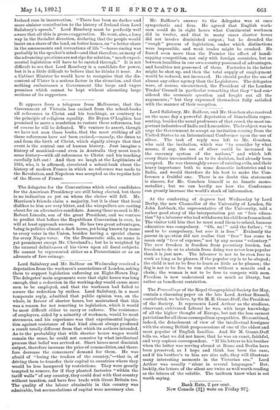At the conferring of degrees last Wednesday by Lord Derby,
the new Chancellor of the University of London, Sir John Lubbock, the representative of the University, told a rather good story of the interpretation put on "free educa- tion" by a labourer who had withdrawn his children from school. The visitor told him that he must send them to school, because education was compulsory. "Oh, no ! " said the father ; "it used to be compulsory, but now it is free." Evidently the parent in question did not realise that "free" has come to mean only "free of expense," not by any means "voluntary." The new freedom is freedom from pecuniary burden, but freedom to do or to abstain from doing was never less popular than it is just now. The labourer is not to be even free to work as long as he pleases, if the popular cry is to be obeyed ; the child is not to be free to learn as little as he pleases ; the dog is not to be free to run about without a muzzle and a chain ; the woman is not to be free to compete with men. Freedom is now understood not so much as liberty, but rather as beneficent restriction.






































 Previous page
Previous page